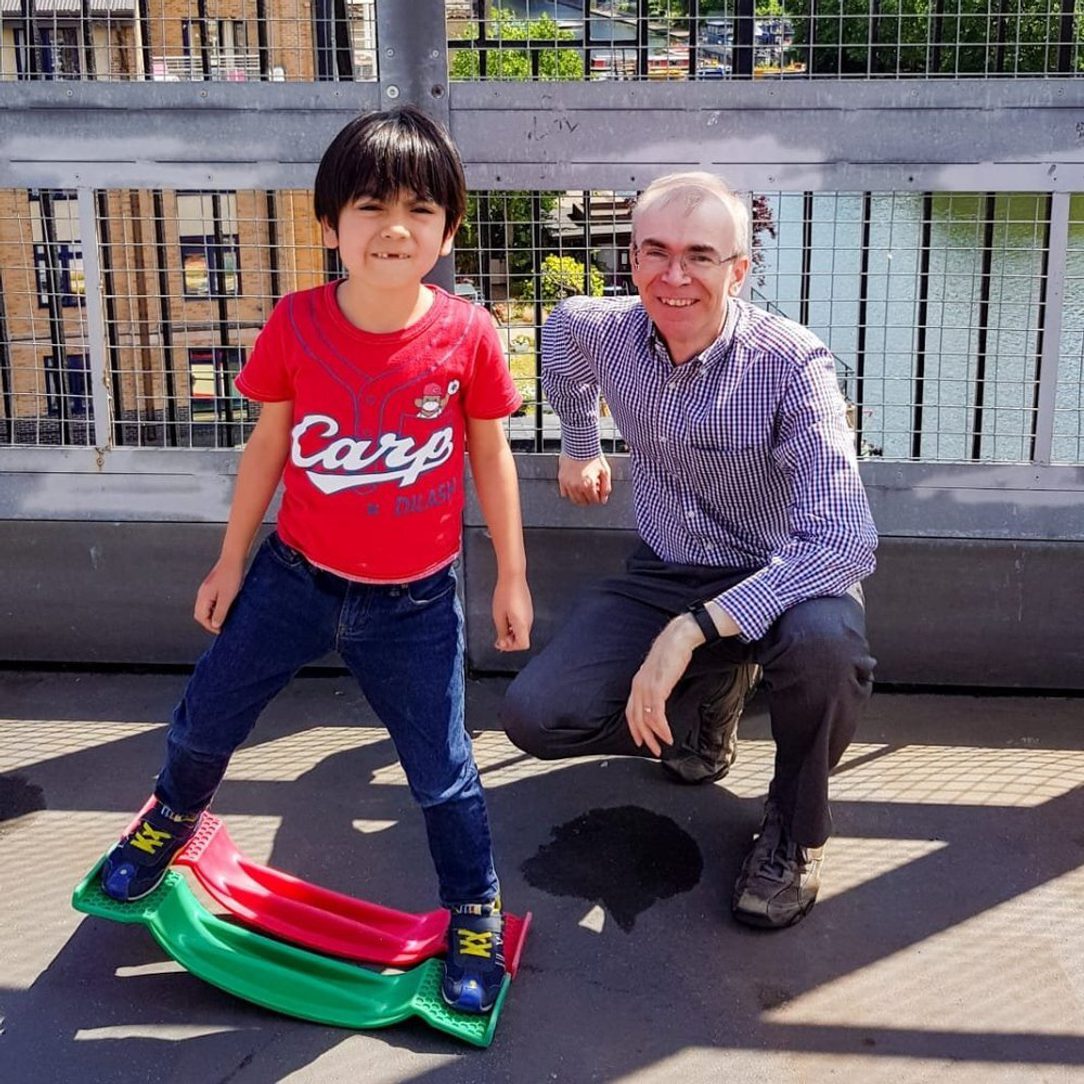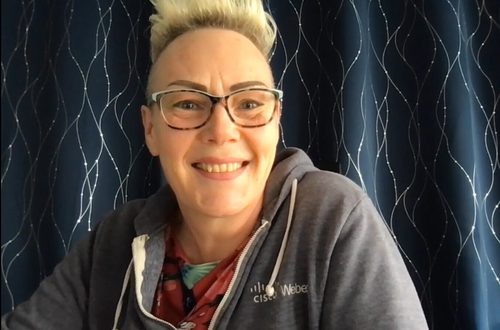27 February 2023
Why I volunteer - Eddie Durrant, NCR
“Be consistent, persistent, and introduce variety”
Share this page

Eddie Durrant is a privacy programme manager at NCR Corporation and has been a reading volunteer as part of the NCR team of volunteers since our launch in the UK in 2018. With four full years of reading with a child under his belt, Eddie offers some excellent advice and inspiration. Based up in Dundee, the online Chapter One model has enabled Eddie to be paired with children in London schools and, since September 2021, he has added Chapter One @Home sessions to the online sessions he delivers in the school setting.
Why did you sign up as a volunteer for Chapter One? What spoke to you about the programme?
When Chapter One was offered to us at NCR as something to get involved in I thought it was a really good idea. I'm a parent, but my kids are grown up and I'm in that in-between stage, between children and grandchildren, so I've got some bandwidth right now. You can feel like you've got no bandwidth when working fulltime, but I'm one of those people that goes by the maxim that if you want something done, ask a busy person. So slipping a half hour, or an hour, into my week to read with a child isn't a great stretch and my company support it anyway.
Were you particularly attracted by it being an online volunteering opportunity?
Yes, it's convenient and it's easy to do. My job involves working with a computer screen all day anyway, so it's easy for me. I've always been decent with English at school and beyond, and in my job I have to be good at wordsmithing and grammar. So Chapter One is just a natural fit for me.
Could you tell us what you’ve learned and observed about reading with a child over the four years you’ve been a volunteer?
I think the things I've learned are that you need to be consistent, persistent, and introduce variety in each session and don't be scared of tailoring them to the child. For example, the child I was reading with before my current one had really been struggling. Even though it was his second year of the Chapter One journey, his concentration was lacking in some of our earlier sessions. So rather than labour it, I switched to doing a couple of 20-minute sessions a week with him rather than one 30-minute session, making our sessions shorter and sharper. I also tried other strategies to engage him because it was clear he was a bright child, but just struggled to focus. While there are the children who will struggle with the actual reading skills, I find the bigger challenge is finding ways to build up their confidence in their own reading abilities. That’s what the Chapter One practice is all about and that's what I have found with each of the children I’ve read with in their own separate ways. It’s about building their confidence up and reinforcing what they learn from the teacher in the classroom.
Reading with an adult with Chapter One enables children to expand their vocabulary and become more confident readers without thinking about it. The difference for me this year has been doing the Chapter One @Home reading sessions with my child as well as the classroom based sessions. It’s been interesting because it's a totally different dynamic when the child’s in their home environment. You've got a family member sitting with them. My child has an older cousin who sits in with her at the moment, who sometimes jumps in to help her. Initially I tried to stop that but then I thought, “No, that's actually a good thing”. It’s good for the little girl to see her family interested and engaged and it's complementary to our classroom sessions. It's been interesting. We don't always have a home session because of the family's availability so overall we're not doing double the sessions, but we're doing much more than one session a week.
Has being a volunteer changed your perception about literacy? Were you aware of the scale of the literacy gap in the UK before you started?
I keep up with the news and social affairs so I had some awareness but I had never witnessed it first-hand. Both of my kids were pretty strong readers from an early age so you kind of take that for granted. When you come across children that aren't strong readers it does make you pause and think, “Maybe you're not getting the support you need” and you realise what this kind of reading support programme can achieve.
Have you got any tips for anyone starting out on the Chapter One journey?
I would go back to what I said earlier: be consistent, persistent and offer variety. The pattern I tend to fall into now is to open a session with flashcards because that’s a good way to get the child engaged and then move into reading stories at their level. Go through as many stories as you think they're interested to read, so that might be just one or it might be three or four. If there's a particular subject or theme in one of the stories that seems to pique their interest, then I tend to jump onto the whiteboard feature and we'll just talk about it some more. I'll throw words onto the whiteboard that are to do with that subject, for example it might be baking, space or animals. I might also try to relate the words to their world if they have offered information about their family and daily life. Then from those words we enjoy writing stories together.
I do use the games on the platform too, although they tend to be repetitive. Once you’ve got established, concentrate on more creative things like using the whiteboard. I’ll often jump up several reading levels, get the child to pick a story, and then read that to them so that they get more exposure to new words and it’s more interesting for them than always just plodding through the very simple stories.
I would also recommend to new reading volunteers that, even if they don't get a reply, they should reach out to the teacher every so often to drop them a few lines about what progress or problems they're seeing with their child. I've had some teachers who have been clearly overwhelmed and haven’t responded, but the latest teacher is very responsive. I think it's always good to offer.
You have to be a bit flexible with scheduling as well. There's often a disruption to the class schedule. Having now been an online reading volunteer for four years, I know to avoid scheduling sessions on Mondays and Fridays because of bank holidays and term-end disruptions. I have found that Tuesdays, Wednesdays and Thursdays are more reliable days. And mornings tend to be better because some children don't concentrate as well later in the day. I know I’m probably going to get a better result if I stick to those days and times.
Keeping track of progress
From the very beginning of his Chapter One volunteering journey, Eddie has been diligent about taking notes after each of his reading sessions with his pupils. He has logged his observations about what went well, the setbacks that he or his pupil encountered, and the general mood of the session. As well as providing invaluable feedback to us and the classroom teacher, the logs have enabled Eddie to reflect on and adapt his sessions to better help his young student. They also provide a wonderful glimpse into the experience of being a Chapter One online reading volunteer. Here are some excerpts from his log taken during his first year as a volunteer reading with Gabriel (not the child's real name) over the 2018-19 school year.
30 November 2018:
In this first session the teacher said that Gabriel was initially upset but he did come to the phone. We started with just myself reading a story to get into it. Then Gabriel picked a story he liked (football!) and began to engage; after I had read through this story, we looked at it a second time and he read through by himself with only some words requiring help. We then read through a 3rd story together just before finishing, again with some words requiring help (sounding out).
7 December 2018:
In this second session, Gabriel joined the call on time and participated, although engagement was markedly less than in the prior session. We read through 3 stories and it was noticeable that Gabriel was not reading the words, often guessing at words/sentences (sometimes not even on that page). As such, Gabriel needed help with many words, even those he had previously sounded out correctly.
5 March 2019:
Read 3 stories at assigned level (Blue) and was quite fluent with minor corrections for pronunciation; tried a long story from the next level (Green) and this went well, although more assistance was needed with several words. Good comprehension and engagement in spite of poor audio.
25 April 2019:
Back after the Easter holidays with a make-up session (missed last one due to end of term activity); began with a Green level story which Gabriel read well; moved up to the Orange level stories, Gabriel read confidently with some corrections, introducing new names and words; Gabriel was engaged but has a tendency to rush a little and skip ahead or repeat words wrongly after being corrected, but generally is doing well and showing good comprehension. Issue with headset; Noisy classroom> still some issues with the headset at times, this might be the student holding on to the mic as at other times it is fine; some background noise from class, but overall ok.
28 June 2019:
Reading at Purple Level - Gabriel read quickly and confidently with just a few new words to learn along the way which he did well; his enthusiasm for reading stories makes these sessions very enjoyable and he engages well to talk about each story and to understand any new words.
2 July 2019:
Gabriel seemed distracted and had trouble picking a story - suggested one and he agreed and read it well. We then used the whiteboard to talk about Thomas the Tank Engine characters as he likes trains and railway stations, matching character names to engine colours. Session ended early as Gabriel had to go to lunch at 12.00 (the schedule is normally open to 12.30).
4 July 2019 (last session of the school year):
We started with Flashcards at Purple level which Gabriel found all too easy. We moved onto Stories at Purple level and read three. Gabriel read confidently and clearly with just a few corrections for words he was unsure of. It's been a pleasure reading with him and seeing the progress since November.
HOW CAN COMPANIES GET INVOLVED IN CHAPTER ONE?
Chapter One’s virtual, time-efficient, flexible model for volunteering will enhance your company’s employee value proposition, whilst fulfilling CSR or social value commitments around education, social mobility and inclusion. Employees can:
- volunteer online directly from their desks with no travel
- make a direct impact on the lives of children from disadvantaged communities
- support local communities across the UK
- improve their own well-being by helping others
- reconnect with your company’s social purpose
If you’re interested in joining us, we’d love to hear from you! You’ll find out who we currently work with on our partners’ page.. You can contact us here or email sarah.taylor@chapterone.org



